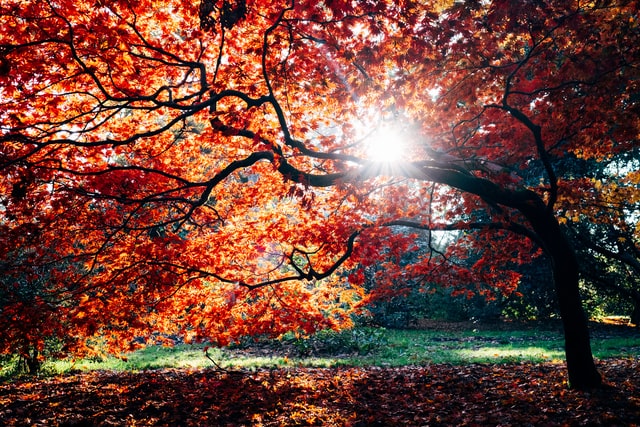The Death of Summer
When the harvest season comes to an end, the people of Vanelle celebrate with a great feast. Discarded wood and debris collected throughout the year is used to build great pyres upon which an effigy of the The Summer Maiden is sacrificed. Her burning symbolises the end of the harvest season and the coming of winter. It is also an offering to the god Hem, in order to ask him to keep homes warm and livestock safe during the winter.
The first preparations are made when the shorter days and cool autumn weather turn the forests of Vanelle the colour of flame. This is a sign that Hem has returned from his summer hibernation deep in the Parede Mountains and is ready to come down to accept offerings made to him. Around this time, the farmers of the land finish their harvests to let the majority of their fields rest, grazing cattle is brought closer to home, and the work to preserve the summer's harvests for the winter has only just started.
For many, this festival will be one of the last times before the following spring they get to enjoy a full meal of fresh produce, and it is a feast to behold. Alongside vegetables of all colours and sizes are fruits, berries and mushrooms foraged from the meadows and forests as well as fresh cheeses, meats and all manner of drinks, both alcoholic and not.
As part of the festivities, there are usually competitions for the largest or most attractive produce, as well as eating competitions as well as an array of games to entertain both children and adults. In most places around Vanelle, the feast is heald outside during the day, around long tables, some capable of seating a whole town. It is a joyful occasion that celebrates the land for all its given and marks the beginning of a more frugal time. As such, everyone gets a seat at the table, regardless of their wealth and social status. On this one day of the year, nobody goes to sleep hungry - that would please neither Vandra who brought the harvest, nor Hem, to whom the Maiden is sacrificed.
When the feasting is over and darkness starts to fall, a procession is formed to carry the effigy of the The Summer Maiden to her place atop the bonfire. While the effigy is a representation of the Maiden, it is usually a crude one made from straw, old garments or cloth and decorated with wildflowers and autumn leaves.
During the procession, the revellers sing and dance. Those who don't carry flowers to throw on the fire carry torches to light it. By this time, the sun has set below the horizon, leaving only the trail of torches to light the revellers' way. As the procession reaches the pyre and the Maiden is mounted on a pole in the middle, they sing a final song in her honour. Those who carried torches throw them on the pyre and once the maiden is ablaze, the revellers make their final offerings of flowers.
The pyre burns for many hours, and many stay until it has died down, reflecting on the passing season and the one to come, or just enjoying the warmth of the pyre with friends and family. This part of the celebrations is quieter and more contemplative than those preceding it. It is a time to give thanks for what has been and ask for good fortune in what is to come.
Darker Origins
While the annual Death of Summer festival can now be considered a relatively civilised affair, it is known to have altogether more barbaric origins. In older writings, songs and depictions of the festival, most of the traditions, dedications and festivities are similar to today's arrangements, with one notable exception. It can be said with a reasonable degree of certainty that the effigy of the The Summer Maiden at some point replaced the actual maiden on the pyre. In older songs sung during the procession taking the effigy to the pyre, it is a real, live maiden that's being sung about rather than a representation of one.The maiden sat upon her throne of greenWhile this snippet is arguably ambiguous as to whether a live maiden was needed, there are many more like it along with tapestries, paintings and tales of Summer Maidens of the past, cementing the fact that she was indeed once a human sacrifice made to Hem in the hopes of providing him with a pleasing bride for the winter. Hem has strong connections to fire, keeping the ritual in line with other ways in which he is worshipped around Vanelle. What this song, in particular, tells us is that the act of burning the Maiden on the pyre is a wedding, and traces of this can still be seen in today's practice; the great feast preceding the ceremony, the use of flowers both during the burning and in the decorations, and the fact that the Maiden is traditionally a virgin - a young and beautiful girl given over by her parents and raised up during the The Festival of Cirra to become a fitting bride for a god. One interpretation of the ritual suggests that the fire is Hem, and perhaps it once was, and the burning of the maiden symbolises him waking up from his summer slumber to take her as his bride. Some of the other songs sung during the procession to, and lighting of, the pyre suggests this to be the case. There is one song in particular where the revellers engage in call-and-response, the men acting as the sleep-drunk Hem and the women as his The Summer Maiden, enticing him to rise from his bed in the mountains to come and wed her. Thankfully, for all the young girls around Vanelle hoping to become the next The Summer Maiden, this no longer happens. With the gods leaving Vanelle many hundreds of years ago, practices like this one have tended to wane and become much milder in their execution. The living virgin sacrifice was swiftly replaced with a straw effigy once people gave up hope of the gods ever coming back to grant them their favour. And perhaps this is for the best. It would seem that a world ruled by gods was in many ways much crueler than the one we have been left with. Nonetheless, The Death of Summer is one of the most popular and widely celebrated festivals of the year in Vanelle, providing much joy to many of its people.
Ready for her wedding
Her beauty golden in the fire's sheen
Ready for Hem to bed her And when the fire swallowed her
Hem rose up to take his prize
Not for a moment did the maiden stir
His favour won as he got his bride
Remove these ads. Join the Worldbuilders Guild













Comments